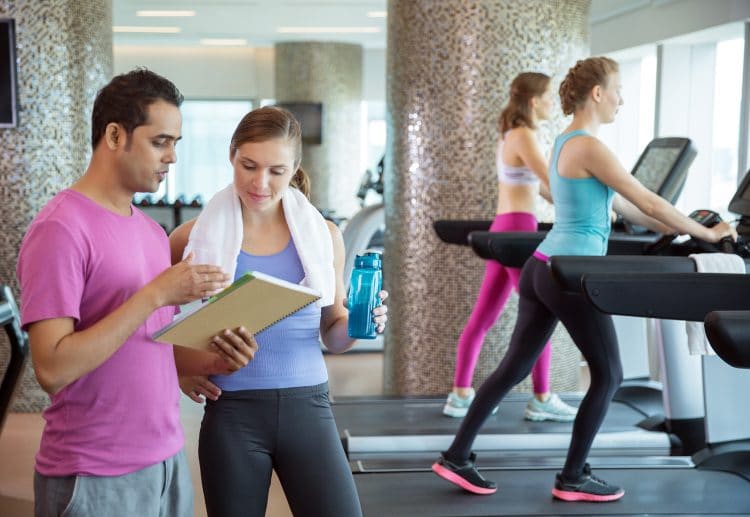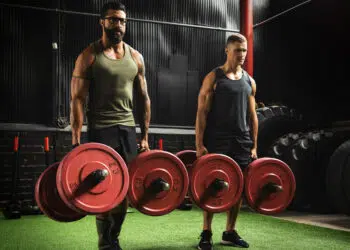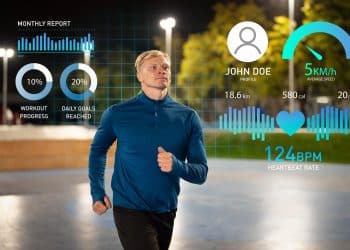Cardiovascular fitness is directly correlated to cardiovascular health, and walking is one of the easiest, most accessible ways to build it.
The six-minute walk test (6MWT) is a straightforward method for determining your fitness, and it’s a test almost every exerciser should be able to pass. We explain why and how to do this test, interpret your results, and achieve a better score.
6-Minute Walk Test (6MWT) Calculator
What is the 6-Minute Walk Test?
The six-minute walk test is as straightforward as it sounds – walk as far as possible in six minutes. The distance covered will reveal your basic cardiovascular fitness.
A lot of cardiovascular tests are difficult to administer, involve complicated equipment and equations, and may require maximal effort exertion. However, some are not suitable for elderly or very young participants. For these reasons, many fitness tests are impractical.
Because the six-minute walk test is so accessible, almost anyone can do it. Six minutes is a tolerable amount of exercise for even unfit participants, and walking is a low-skill activity requiring no specialized equipment. As such, it can be done almost anywhere, anytime, and by anyone. All you need is a means of measuring time and distance.
The six-minute walk test is suitable for most adults and also children. The only real prerequisite is the ability to walk for six minutes!
Level Up Your Fitness: Join our 💪 strong community in Fitness Volt Newsletter. Get daily inspiration, expert-backed workouts, nutrition tips, the latest in strength sports, and the support you need to reach your goals. Subscribe for free!
In studies, the six-minute walk test has been shown to be a reliable predictor of several cardiovascular health risks, including pulmonary arterial hypertension (PAH), heart failure, and peripheral arterial disease (PAD) (1). Walking speed is also an excellent predictor of longevity (2).
That said, if you currently suffer from angina (chest pain), have a resting heart rate of over 120 beats per minute, a systolic blood pressure reading greater than 180 mmHg or diastolic reading above 100 mmHg, or have any other severe underlying medical condition, you should not attempt this test. You should also not do this test if you feel unwell, which will probably affect your score.
Caution: If you experience chest pain, leg cramps, difficulty breathing, or feel ill during the test, you should stop immediately and seek medical attention.
How Does The 6-Minute Walk Test Calculator Work?
The 6-minute walk test calculator uses two predictive equations to determine how far you should be able to walk in six minutes. In addition, if you enter your own test results, it will also tell how your score compares to expected norms in the form of a percentage.
The calculations used to determine your performance are based on gender, age, weight, and height.
The two equations used for the six-minute walk test are:
| Gender | Predicted 6-Minute Walk Distance (6MWD) | 6MWD lower limit |
| Male | (7.57 x height in cm) – (5.02 x age) – (1.76 x weight in kg) – 309 | 6MWD – 153 |
| Female | (2.11 x height in cm) – (2.29 x weight in kg) – (5.78 x age) + 667 | 6MWD – 139 |
How To Use the 6-Minute Walk Test Calculator
The six-minute walk test calculator can be used in two ways. Firstly, you can use it to tell you how far you should be able to walk in six minutes. This can be useful if you are about to do the test and want to know what distance to aim for.
Secondly, you can use the calculator to compare the actual distance you walked to the normative averages to see how you measure up. This will be displayed as a percentage, and you’ll be able to see whether your distance is less or greater than expected.
The calculator is straightforward to use and requires very little information to make its predictions. Follow these step-by-step instructions:
- Select the units – either imperial (pounds and inches) or metric (kilograms and centimeters)
- Enter your weight
- Enter your height
- Enter your age
- Enter the distance walked in six minutes (optional)
- Hit “Calculate“
- Your result will be displayed in the box below the calculator
Note: If any of the boxes have a red outline, it means you have either entered an invalid value or not entered anything at all. Go back and provide the required information for the calculator to work correctly.
If you choose to perform the six-minute walk test, simply walk for six minutes at a brisk pace on a flat, even surface and without jogging or running. You can do this over a measured distance, such as on a running track, treadmill, or using a GPS to track your distance.
Record the distance covered, and then enter your result as instructed above.
What Do the Results Mean?
The calculator will provide you with two sets of results, plus a third if you entered an actual test result.
The Expected Six-Minute Walked Distance (6MWD) is the distance that you should be able to cover in six minutes.
The lower limit of the Six-Minute Walked Distance (6MWD) is roughly 80% of the first figure and is the minimum distance you should be able to walk within the allotted time.
Finally, if you entered an actual 6-minute walk test result, you will also see that value as a percentage of your target 6MWD. So, if you walked further than expected, you’ll see a percentage of 101% or greater. But, if you walked less than expected, you’ll see a percentage of 99% or lower.
Factors That Affect Your Results
While the six-minute is very easy to administer, it cannot be considered 100% accurate because it relies on predictive equations to determine your results. Instead, it caters to populations rather than individuals.
Factors that can affect your results include:
| Factors that may increase 6MWT results | Factors that may decrease 6MWT results |
| Male gender | Female gender |
| Greater than average muscle mass | Higher fat mass |
| Taller height/longer stride length | Shorter height/stride length |
| High degree of motivation | Decreased motivation |
| Being relatively young | Preexisting cardiovascular or pulmonary condition |
| Experienced or regular walker | Sedentarism |
Another factor that must be considered is test standardization. For example, it would be a mistake to conduct the six-minute walk test on a treadmill and then repeat it on a running track and expect comparable results.
Similarly, things like time of day, temperature, and rest status can all affect the results. Ideally, the test should be performed using identical procedures to ensure comparable results.
Level Up Your Fitness: Join our 💪 strong community in Fitness Volt Newsletter. Get daily inspiration, expert-backed workouts, nutrition tips, the latest in strength sports, and the support you need to reach your goals. Subscribe for free!
All of that said, this is still a very useful test, especially if you track your personal performance over time and don’t compare your results to those of others. So, for example, if you walk 560 meters one month and then 610 the following month, it’s a safe bet that you’ve improved your fitness.
How To Improve Your 6-Minute Walk Test Score
The six-minute walk test assesses cardiovascular fitness and lower body muscular endurance. As such, improving either of these things should produce an increase in your test score.
Good activities for improving cardiovascular fitness include:
Useful exercises for improving lower body muscular endurance include:
Losing weight, specifically fat, will also make the test easier so you can walk further. The less weight you have to carry, the less work your muscles need to do, and the more oxygen you’ll be able to utilize to drive you forward and over the ground. Imagine taking off a 20-pound+ rucksack – that’s how losing weight will feel!
The last way to get better at the six-minute walk test is to repeat it frequently, e.g., bimonthly. With practice, you will get better at the test as you learn how to pace yourself and cover the greatest possible distance in the time allowed.
6-Minute Walk Test Frequently Asked Questions
1. What is the six-minute walk test?
The six-minute walk test (6MWT) is a simple assessment of cardiovascular fitness. It compares the distance you can walk in six minutes with expected norms to estimate your current level of aerobic conditioning.
2. Is the 6-minute walk test an assessment of VO2 max?
Cardiovascular fitness is often expressed as your VO2 max, which is the amount of oxygen your body can take in, transport, and utilize in a minute during exercise. The higher your VO2, the harder you’ll be able to work and the fitter you are. VO2 is affected by your lungs, heart, blood, and muscles.
While some fitness tests measure or estimate your VO2 max, the 6-minute walk test does not. As such, it is not as useful for athletes as something like the multistage running test, which does estimate a VO2 max score.
3. What is the single best way to get better at the 6-minute walk test?
Walking more is probably the best way to get better at this test. After all, that’s what you’ll be doing for six minutes! Build up to walking around 7,000 – 10,000 steps per day, making sure at least some of that walking is done at a brisk pace.
You don’t have to do all your walking in one go. In fact, it’s usually more convenient and manageable to do several short to medium walks per day than one long one.
If 7,000 – 10,000 steps sound too daunting, start off with a lower amount, e.g., 3,000, and increase by 500 – 1000 a week until you reach your daily step goal. Use a smartphone app called a pedometer to track your steps.
4. How will losing weight affect my score?
Excess body fat is essentially “dead weight,” and your body must use extra energy and muscle power to carry it. Losing weight will make walking easier, as your muscles will be under less load. As such, your heart and lungs won’t have to work as hard, and you should find you can walk faster with the same or even less effort.
This is why race cars are much lighter than regular cars; it means they can go further and faster, often using less fuel.
5. What should I wear for this test?
You don’t need any special clothing or equipment for this test, but you do need to be comfortable. A pair of supportive, shock-absorbing shoes are a must, but these can be regular sneakers, and you don’t need to wear walking shoes.
Also, make sure you won’t overheat during the test. You are bound to warm up as you walk. Getting too hot could mean that you cannot walk as far as you could have done when feeling cool.
It’s always better to start the test feeling a little chilly, knowing you are going to warm up, than start feeling warm and end up overheating.
6. How often should I do this test
Cardiovascular fitness increases quite quickly, especially in beginners. So, do this test every two weeks or so to see how you are progressing. However, remember that the test isn’t really long enough to improve your current fitness, so if you have to choose, it’s usually better to work out than do a fitness test.
6MWT – Wrapping Up
It doesn’t matter how big your biceps or how sculpted your abs are; your heart is the most important muscle in your body. After all, every minute of every hour of every day, you’re your heart that is pumping blood around your body to keep you alive!
Because of this, cardiovascular fitness, which concerns your heart, lungs, and circulatory system, is crucial and inextricably linked to your health and longevity.
Long story short, you MUST do your cardio!
Use the 6-minute walk test to assess your current fitness, reveal if you need to do more work on your cardiovascular conditioning, and measure improvements.
According to the American Heart Association, most adults need to accumulate 150 minutes of moderate-intensity aerobic exercise a week, or 75 minutes of intense aerobic exercise (3). Consider these the minimum for warding off cardiovascular disease and other conditions caused by poor fitness and sedentarism.
References:
1– PubMed: The 6-Min Walk Test: A Quick Measure of Functional Status in Elderly Adults https://pubmed.ncbi.nlm.nih.gov/12576356/
2– PubMed: Gait Speed and Survival in Older Adults https://www.ncbi.nlm.nih.gov/pmc/articles/PMC3080184/
3– American Heart Association: Recommendations for Physical Activity in Adults and Kids https://www.heart.org/













